Obama’s Asian adventure
Al Jazeera’s Steve Chao explores what the US president can expect when he tours Asia.
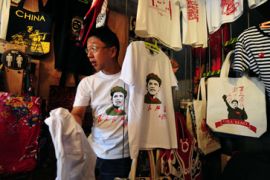
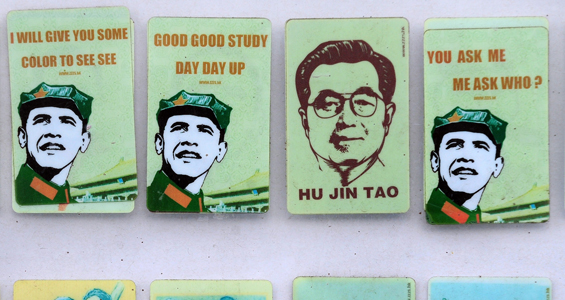 |
| Obama’s attempts to distance himself from his predecessor has boosted his status in Asia [AFP] |
As Barack Obama, the US president, begins his first trip to Asia, he will be doing so at a time when American influence on the world’s most populous region is seen to be fading.
“The age of America as the world’s superpower has come and will soon pass,” says Li Chun Hwa, a Beijing cab driver, rather boldly.
Li was one of millions of Chinese that invested his life savings into stocks, buying into the western-styled wisdom of fast returns on the market floors of capitalism.
Those floors collapsed this past year as speculative investments by US banks and financial institutions drove the world into financial crisis.
“America has been too busy extending itself, spending on wars in Iraq and Afghanistan.
“Now it’s broke, and it’s policies have lost friends around the world … what it says and does holds less meaning now,” says Li.
Overcoming perceptions
That may be overstating the reality, but it is part of the perception Obama is gearing up to overcome as he meets Asia’s leaders during his trip.
In just seven days, the president will travel through Japan, Singapore, China and South Korea. But his agenda is far more reaching.
He plans to strike a new relationship with Myanmar, convince some Asian nations to commit more resources to Afghanistan, deal with climate change, and tackle trade disputes with China.
He will do this all while talking human rights and trying to get China’s leaders to side with him on the nuclear issue involving North Korea and Iran, among other things.
“Through President Obama’s trip, I think it will be vividly clear to the peoples of Asia that the US is here to stay in Asia,” Jeffrey Bader, director of Asian affairs at Washington’s National Security Council, says.
The first stop will be Japan. And according to his aides, the order of countries to visit is “not by accident”.
‘Independent relationship’
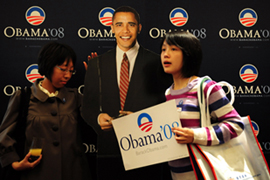 |
| Many people across Asia are anticipating Obama’s visit to the region [AFP] |
As America’s staunchest ally in the Asia Pacific region, Japan – and its new left-of-centre government under Yukio Hatoyama – has been calling for a more “equal” and “independent” relationship with the US.
Since giving the Liberal Democratic Party it’s first defeat in 50 years, the newly-elected Hatoyama and the Democratic Party of Japan have pushed for closer ties with China, while at the same time raising the possibility of evicting US forces from a base on Okinawa – moves that worry policymakers in Washington.
Japan remains a key player in Washington’s strategy of having an Asian nation to counterbalance China’s military rise.
US officials say that during his meetings with Hatoyama, Obama will strive to “reaffirm” that “partnership” – one that has existed since the end of the Second World War.
Emphasising co-operation
“Co-operation” rather than “confrontation” is said to be theme of this Asia mission – a mission where bringing the world economy back to health is a top priority. The region, and more specifically China, has been credited for leading the global recovery in 2009.
And some analysts say while the previous Bush administration may have been able to largely ignore Asia, the US government can no longer do so.
Obama’s decision to attend this year’s summit of Asia Pacific Leaders (Apec), in Singapore is a signal of this new approach.
Joining him will be an all-star American cast – Secretary of State, Hillary Clinton, US Trade Representative, Ron Kirk, Commerce Secretary, Gary Locke and Treasury Secretary, Timothy Geithner.
Their very presence, says Michael Froman, Washington’s International Economic Affairs adviser, underlines that the president, “understands the importance of Asia in the 21st Century and that its going to be engaged in a very comprehensive way.”
Myanmar factor
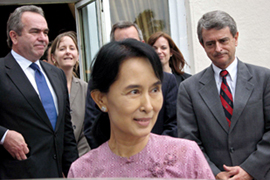 |
| The US has called for the release of Aung San Suu Kyi, Myanmar’s opposition leader [AFP] |
It will be at Apec that Obama will also engage the government of Myanmar. He will be the first president in history to meet with its leaders on Sunday, during a meeting of Southeast Asian nations.
Already, Myanmar’s rulers are said to be appreciative of the “new” US policy of “openness”. And while its officials deny a connection, the country is now considering releasing Aung San Suu Kyi, the opposition leader who has been under various forms of house arrest for the past 14 years.
After weeks of speculation, US officials say Obama will also be directly raising the issue of human rights with Hu Jintao, the Chinese leader.
Policy challenge
How exactly to engage the “middle kingdom” has been a policy challenge.
The US knows it must tread carefully at a time when China is growing in international influence.
Obama himself, in recent interviews, says he sees the country as both a “vital partner”, and a “competitor”, but that he hopes to strike a “friendly” relationship.
China’s leaders this year have shown a newfound boldness in taking on the US in its drive to secure energy and natural resources.
As the US sought sanctions to curb Iran’s suspected nuclear ambitions, Chinese officials have not only moved to block them, but have pressed ahead to sign more than $5bn in oil and natural gas deals.
Beijing has also made similar business arrangements with some African nations that have questionable human rights records.
In his visits to the cities of Shanghai and Beijing, Obama is expected to try and convince China’s leaders to play a more constructive role when it comes to making the world a “better” place.
It is a move that in part recognises China as a future world leader. But the nation of 1.3 billion people has in the past proven to be a reluctant player, holding to its policy of “non-interference” in matters of another nation’s “domestic interests”.
China’s role
Still, there are signs Chinese officials are recognising a need to take on “policing” roles that have traditionally been expected of America.
This year, the country’s navy has joined the international effort to protect ships from pirates off the coast of Somalia. Its soldiers have also taken part in 16 of the last 24 UN peacekeeping missions.
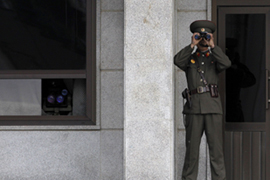 |
| The US expects China to persuade North Korea to nuclear talks [Reuters] |
It has also played a pivotal role in recent years, in bringing North Korea back to the table for nuclear disarmament talks.
Obama is expected to ask China to push North Korea’s leaders even harder for a final and comprehensive deal to de-weaponise the Korean peninsula.
Meanwhile, Obama will have to move to resolve trade disputes that have flared over tires, steel and several other industries. American companies have been up in arms over “cheap” Chinese products allegedly flooding the market.
At the heart of the issue, say industry officials, is the fact that the renminbi, China’s currency, is far undervalued, making it easier for Chinese companies to sell their goods in the US but impossible for American businesses to make inroads in China.
“If we don’t solve some of these problems, then I think both economically and politically it will put enormous strains on the relationship,” says Obama.
Analysts say the president’s approach of “open dialogue” has gone far in building consensus with a nation that has long-held suspicions of the West, and they believe this trip may lead to better economic and political ties.
“Certainly this administration’s approach to China has led to what we can categorise as the warmest-ever relationship between the two countries,” says Kerry Brown, a senior research fellow of Asian Studies at Chatham House.
While some recent polls suggest that America’s standing has fallen in Asia, Obama’s personal popularity remains high.
White House officials believe that Obama’s reputation is valuable currency in reestablishing US presence in the region.